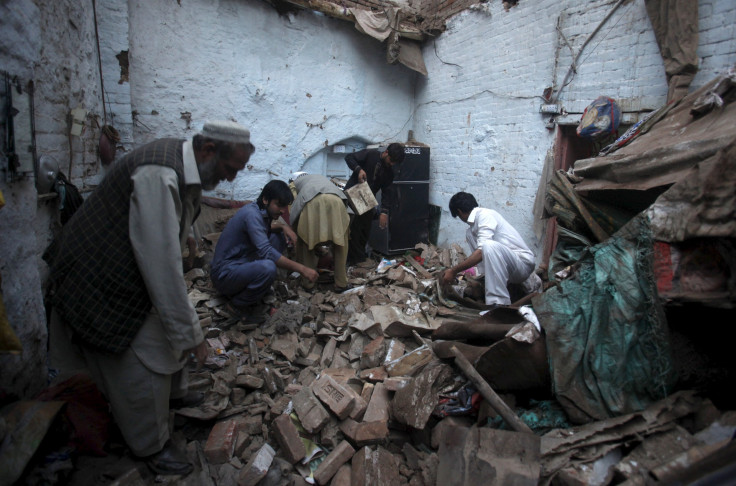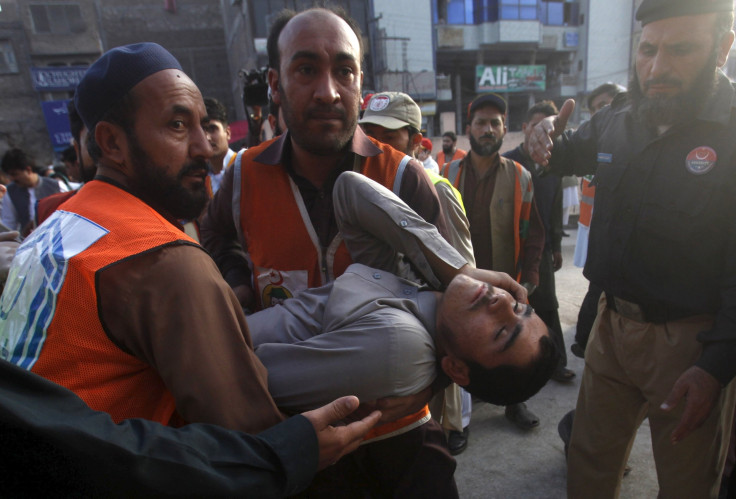Afghanistan Earthquake 2015 Recovery A Test Of Politics? Amid Economic Woes, Reconstruction Could Be Tricky, Analysts Say

The mountainous region at the epicenter of a massive earthquake in South Asia has been the site of countless quakes, mudslides and avalanches over the years. But Monday's 7.5-magnitude earthquake there was by far the worst disaster the region has seen in years, eyewitnesses said. Though the full extent of damages was still unknown, hundreds of people were believed to be dead, and homes across Afghanistan and Pakistan reportedly collapsed as a harsh winter loomed.
The country's latest natural disaster apparently couldn’t have come at a worse time for Afghanistan. As responsibility for its security and economy has transitioned from foreign forces back to the Afghan government, much of the foreign aid that poured into the country over the past decade has dried up. At the same time, the Kabul government, gripped by infighting and corruption, has struggled to fight off a militant insurgency that has steadily strengthened over the years. With the risk of further tarnishing the government's image a real possibility, analysts said now is the time for politicians to pull together and prove themselves capable of overseeing a recovery that may not be as severe a burden to the country's economy as it might seem.
“One would expect that these incidents would create more demand and expectation from people [for the government] to better handle the situation,” Abdullah Ahmadzai, the Asia Foundation’s country representative in Afghanistan, said. “So I think the rise in public tensions [will increase] in terms of expectations versus what they receive in support from the national government.”
The country's leadership has vowed to assess damages and respond swiftly to the situation. They called for an emergency meeting shortly after the earthquake struck Monday.
President @AshrafGhani: My prayers for all those affected by today's powerful #earthquake in #Afghanistan and our region. (1/3)
— ارګ (@ARG_AFG) October 26, 2015
(2/3) We are collecting information to have an accurate assessment of today's #earthquake damages across the country.
— ارګ (@ARG_AFG) October 26, 2015
(3/3) All government agencies will remain on stand-by to assist victims of today's #earthquake & carry out rescue operations if needed.
— ارګ (@ARG_AFG) October 26, 2015
Afghanistan has been facing a massive financial crisis in recent years. The country, ravaged by decades of war, has depended on a steady flow of international investment and charitable giving. But the U.S. Congress voted to cut development spending on Afghanistan by half last year. At the same time, growing internal strife in the country has led to hiked-up expenditures, and Afghan government revenue has stagnated.
Christina Northey, a director of the international humanitarian organization CARE, based in Afghanistan, said in a statement that her colleagues in the hardest-hit areas of the country reported widespread devastation. They are concerned by the earthquake’s impact on the most “poor and vulnerable people.” As the northeastern Badakhshan region's geography makes it extremely hard to reach, few images have yet emerged. The U.S. Geological Survey said economic losses to the region -- where infrastructure is limited -- will result in less than 1% of the gross domestic product in Afghanistan, but experts warned the implications are likely to be much more far-reaching than early projections might suggest.
"What is catastrophic is relative to how much infrastructure and services you have access to ... so when you have reduced infrastructure, reduced access and a tenuous security situation, that's going to have some impact -- certainly on the local economy in terms of people's ability to be consumers -- but also on the broader country," Jena Karim, deputy representative in Afghanistan for the Asia Foundation, said.
Ahmadzai said people in the country’s capital, Kabul, were growing uneasy about the vacuum of information. In the past, the government has had trouble coping with natural disasters and has received criticism for lacking transparency.
“People are in waiting mode … but later, if we don’t get reliable information, the outcry will go up,” he said. “Unfortunately it’s been six hours since the earthquake, and we still don’t have reliable information of what damages look like.”

While many on the ground are likely to demand a quick recovery, reconstruction and data collection are likely to be complicated by the region's topography. Not only is Badakhshan, the heart of the damage in Afghanistan, a mountainous region, but snow has begun falling, and winters in the region can be brutal. It has also been the site of fighting in recent years, as the Taliban has made gains in much of Afghanistan's countryside. Any recovery in an area as disconnected and conflict-ridden as northeastern Afghanistan is likely to take time, experts said.
“It may be perceived as a test of the government, but we know in this part of the world it’s very hard for any government to do that much,” said William Byrd, a senior expert on Afghanistan for the United States Institute for Peace in Washington, who was based for four years in Afghanistan. He warned that reconstruction is likely to divert resources from other needed development programs.
“There’s an awful logistical and mountainous situation and hard-to-reach people, so response tends to be slow, recovery takes longer, and reconstruction is challenging. Adding to that, it’s already becoming winter, so we can imagine this will be a major humanitarian problem,” Byrd said, though he added that it remained unclear how widespread damage in the northeast is. Early reports indicated the most substantial damage is in neighboring Pakistan.
International aid organizations, which have routinely provided aid to Afghanistan over the years, said they were ready to step in if the Afghan government requested. United States Agency for International Development, a U.S. government aid agency also known as USAID, told International Business Times it had not yet received a request for emergency support from regional governments. Experts said that while international support is likely to be required, decisive action and a well-planned recovery could boost support for the Afghan government, and ultimately work to win over credibility.
“A possible silver lining is this is kind of a wake-up call for the unity government,” Byrd said, noting that the country's political leadership has been set back by infighting. “The country is facing national emergency from war, and maybe this will bring people together.”
© Copyright IBTimes 2024. All rights reserved.






















